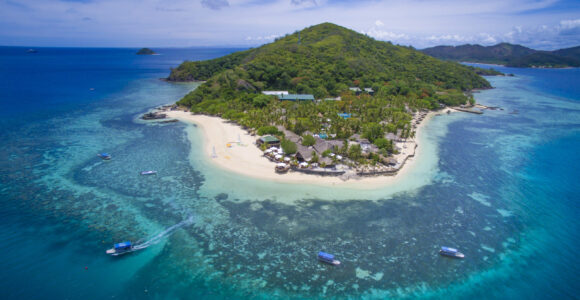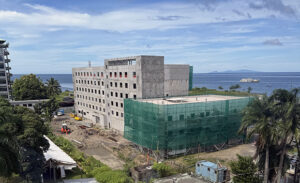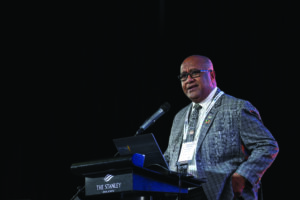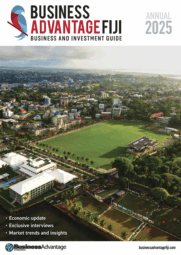With its economy buoyed by a resurgent tourism sector, Business Advantage talks to business leaders in Fiji about the opportunities that lie ahead for the Pacific Islands hub.

Fiji’s economy has rebounded on the back of a resurgent tourism sector. Credit: Tourism Fiji
Fiji in 2025 finds itself at the tail end of a strong four-year economic rebound following the COVID-19 pandemic.
“Our economy grew by 19.5 per cent in 2022 and about 7.5 per cent in 2023,” explains Ariff Ali, Governor of the Reserve Bank of Fiji. “Growth in 2024 was 4 per cent, and, this year, we are looking at 3.2 per cent, which is back to our historical growth rate.”
Business conditions in the country are generally stable, with interest rates at historic lows and inflation also low.
Building capacity

The Hilton Garden Inn Suva under construction. Credit: BAI
While Fiji is an island archipelago, it is very much connected to the other key economies in the region in which it sits.
“A lot of Fiji’s economic drive is really generated by the wealth that sits outside of the country – either from tourists in nearby markets like Australia and New Zealand, or from citizens of Fiji who are working overseas and sending money back home,” observes Kishti Sen, Pacific Economist at the ANZ Bank.
“Fiji is on an exciting, ambitious digital journey”
“So, if you want to say something about Fiji’s future growth, you have to look at those markets where Fiji’s income is generated.”
These markets continue to be beneficial to Fiji. The country’s tourism sector attracted a record one million visitors in 2024 and is also tracking strongly in 2025.
Tourism investors are now moving to address capacity issues – including an estimated 5000-key shortfall – that Ali sees as a one of the brakes on Fiji’s current economic growth.
While the international hotel brands in Fiji will be familiar to global travellers, the investors behind these developments are often local entities with diverse investments across Fiji’s economy. These include the country’s big three institutional investors: the Fiji National Provident Fund, Fijian Holdings and BSP Life.
Not just tourism
While tourism is Fiji’s dominant sector, it is by no means its only source of foreign income. The country has a track record of exporting sugar, vegetable and animal produce, garments, wood products, as well as gold from its two productive mines on its largest and most populous island, Viti Levu.
More recently, two lucrative new lines of business have emerged.
Mineral water is now Fiji’s biggest manufactured export, thanks in part to the success of the United States’ agricultural giant The Wonderful Company’s FIJI Water brand in the US market and the work of locally owned competitor, Pleass Global.
According to provisional Fiji Bureau of Statistics figures, mineral water accounted for 27 per cent of Fiji’s exports by value in 2024.
While the success of mineral water has been arguably built – in part – on Fiji’s reputation for having a pristine natural environment, its other recent success story has been built on its man-made advantages: an educated, English-speaking workforce and a robust telecommunications network.
Since 2000, when Southern Cross undersea cable made internet connectivity affordable and reliable in Fiji (augmented in 2022 by Southern Cross NEXT), businesses have been able to use Fiji to support their back office processes.
“Of the just over 600 staff we have here in Fiji, I’d say the majority of them don’t just service this business, they also do work for our other markets across the Pacific,” notes Rabih Yazbek, Country Head in Fiji for Australian bank, ANZ.
Outsourcing
More recently, this has seen the development of a fully-fledged Business Process Outsourcing (BPO) sector under a peak body, Outsource Fiji.
“We’ve had a lot of growth in the outsourcing sector,” Carol Watkins, CEO of one of Fiji’s largest BPO providers, Centrecom, tells Business Advantage.
“During COVID, businesses that had outsourced to the Philippines started looking around to see what else was out there. They really liked the neutral English accent here and Fiji’s proximity to Australia and New Zealand. And then there’s our very high literacy rate here.”
The quality of education in Fiji means its BPO sector can handle higher value work, as Kamal Chetty, CEO of Investment Fiji (the government’s investment promotion agency), explains.
“Fiji’s BPO sector is not only call centres; it’s also knowledge process outsourcing. KPMG has got their artificial intelligence centre here. It’s also about cyber security and all those things.”
Infrastructure expansion

Fiji’s Deputy Prime Minister and Minister of Trade, Cooperatives, Small and Medium Enterprises and Communications, the Hon. Manoa Kamikamica. Credit: BAI
Far from standing still, Fiji’s telecommunications system continues to expand and improve on the back of some high profile new developments: notably, the entry of satellite provider Starlink into the market and the connection of Fiji to two new undersea fibre-optic cables owned by global tech giant Google.
“Fiji is on an exciting, ambitious digital journey, one that is fuelled by our unwavering commitment to innovation, social economic growth and inclusivity,” says the Hon. Manoa Kamikamica, Deputy Prime Minister of Fiji and Minister for Communications.
“With the Google investments, we anticipate that it will create more than 3600 jobs by 2030 and contribute an estimated F$250 million to Fiji’s GDP.”
Infrastructure spend
Beyond telecommunications, infrastructure investment is also slated for other sectors.
“If you look around Fiji, the challenge to Fiji is old infrastructure, whether it’s the roads, hospitals or water. It’s at a stage now where you really need to take it to the next level,” observes Jaoji Koroi, Group CEO of Fijian Holdings, one of Fiji’s largest institutional investors.
Pursuant to the country’s National Development Plan, 2025–2029, there are already concrete plans to upgrade the country’s key airports and maritime ports,
while the country’s energy provider, Energy Fiji Limited, is embarking on a ten-year journey to take the country from 46 per cent to 90 per cent renewables-generated electricity by 2035.
This will require the commissioning of new solar, hydro and wind power plants, as well as F$700 million worth of upgrades to the country’s transmission system.
Recent works have also upgraded the foreshore area of Fiji’s second-largest port, Lautoka.
Brain drain
As the success of its tourism and BPO sectors demonstrates, one of Fiji’s major assets is its people.
However, with less than 60 per cent of jobs taking place in Fiji’s formal economy, moving overseas to work has been a long-established and beneficial practice for Fijians, providing them with incomes that often return home in the form of remittances to family and friends.
Migration for work accelerated rapidly after COVID (in 2023, for instance, a net figure of some 46,000 citizens – around five per cent of the population – left the country), further encouraged by Australian and New Zealand government schemes aimed at attracting Pacific Islands workers.
While this migration has delivered an explosion in remittances – rising from F$500 million to F$1.2 billion annually – it has also resulted in a noticeable “brain drain” locally, which has left the country’s employers with some human resource challenges.
The words of Rahul Amin, CEO of retail, construction and tourism conglomerate, the Vinod Patel Group, are typical of many of the employers we spoke to for this publication.
“It affects us in a big way. It’s becoming harder and harder to get people to assist in our growth plans.”
While larger businesses have their own internal training programs, and are in some cases bringing in foreign labour, Fiji’s government is also focused on addressing the current skills gap.
This is an edited version of a story that appeared in the 2025 Business Advantage Fiji publication. Read the full publication here. 








Speak Your Mind